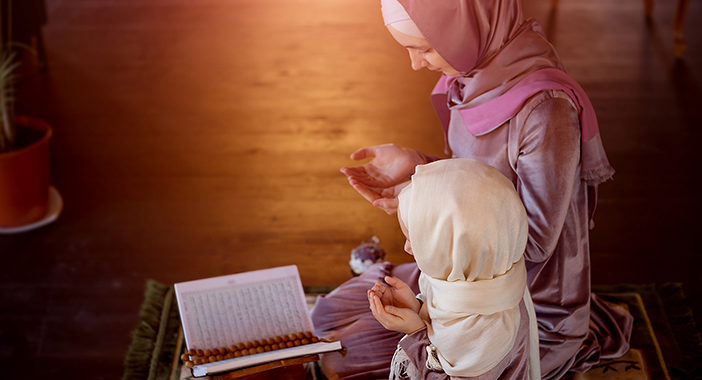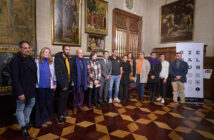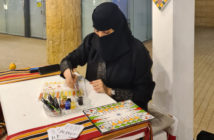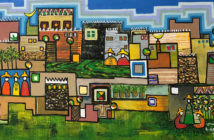Muslims around the world enter the most anticipated time of the year: Ramadan. Although many Ramadan traditions will be different this year because of the ongoing coronavirus pandemic, the spirit and values of the holy month prevail.
The holy month of Ramadan is upon us; this pillar of Islam is the month when Muslims fast; abstaining from food, drinks, and other worldly pleasures from dusk until dawn. Ramadan begins at a different time each year based on the moon cycles. For Muslims, it is the most anticipated time of the year and preparations often take place weeks before. Daily shopping trips, endless rolling of sambusa, and the buzzing and bustling of households and souks traditionally add to the excitement of the month ahead.

On the first day of Ramadan, families gather for iftar (breakfast), participate in tarawih prayers at their local masjid with their neighbors, and enjoy the pre-dawn suhoor meal together. Evening outings at shopping malls, restaurant iftar and suhoor parties with friends and relatives are the norm throughout the month.
This year, however, Ramadan will be different. Coronavirus has wreaked havoc in the world. Many families are separated. Several countries are in lockdown, communal prayers at the masjid are temporarily prohibited, and restaurants won’t be offering their popular Ramadan festivities. As depressing as the situation may seem, it’s not all gloom and doom. Though we may not be able to partake in many of the usual traditions, the essence of the holy month remains. We can take comfort in knowing “Verily, with every difficulty, there is relief” Quran (94:5).
Ramadan itself and the abstaining from impulses release us from superficial desires. We experience what it means to go without these unnecessary wants bringing us closer to our true needs. Nevertheless, lavish expenditures are still commonplace during Ramadan, and families often spend greatly on new clothes and household furnishings. This Ramadan, with its limited shopping opportunities, gives us the chance to focus even more on prayer and introspection rather than the materialism of today’s age. The month of Ramadan [is that]in which the Quran was revealed [as]guidance for the people (2:185) This time at home may allow us to focus on the greatest gift Muslims were granted in this holy month.
With our hectic modern lives, many of us have moved away from the kitchen and opted for quick and convenient meals. What better time to explore your inner chef and prepare some of the recipes you have grown to love. This may be even a bonding experience with elders in your family who can share their tips and recipes via video chat. Ramadan is incomplete without sweets! Try your hand at making kunafa or luqaimat or order out and support your favorite local businesses.
This year, the time confined to our homes makes for a perfect opportunity to involve the whole family in Ramadan. Families with children will be able to sync family members schedules and eliminate some of the usual stress of school runs. There is more flexibility in distance education, which can be a relief for parents who usually have to juggle the school schedules with their own. Decorating the house, reading and interpreting the Quran and ahadith at home with your loved ones instead of at the mosque, and involving the children in meal preparations instill the Ramadan values and traditions. Gurgaon, half-way through Ramadan when children dress up in traditional clothing and go door-to-door collecting treats and money from neighbors, can still be celebrated in a more intimate setting at home. Listen to traditional songs, dress up, and make gift bags. Don’t forget, during Ramadan and other times of the year, boredom is okay. When children find ways to entertain themselves (without electronics) it boosts their brainpower and creativity.
Charity is a fundamental part of Ramadan, and this year offers us many opportunities for Sadeqa, or giving without expectation of anything in return. Giving doesn’t have to be substantial, but it’s useful to think about in advance. Consider making a monetary donation towards a cause close to your heart, teach others a skill via Youtube, or help someone find a job. “A good word is a charity; and removing a harmful thing from the road is a charity.” (Al-Bukhari, Muslim). With many local restaurants offering meals to those hard-hit by the virus and many trustworthy associations offering Ramadan relief packages for such families, we now have an abundance of options to support others in need. Consider spreading your donations across different organizations for maximal effect.
Also, keep in mind that even a smile or lifting a thorn from the road is charity, check in on your neighbors, relatives, friends as you would’ve in any Ramadan, offer to help the elderly get their groceries or medicine through this lock down and listen to anyone who wants to talk. Every action counts.
Non-muslims living in Saudi Arabia are encouraged to join in the spirit and traditions of the holy month. What better time to educate yourself and your family members about this most-important time for your host country. In addition to participating in the traditions explained above, consider exchanging Ramadan greetings, such as Ramadan Kareem or Ramadan Mubarak, with your friends and colleagues. Dressing modestly, especially during the holy month of Ramadan, shows respect for Muslims. Experiment with your modest styles and have fun incorporating some traditional attire or accessories.
Daily life for muslims and non-muslims living in Saudi Arabia changes during Ramdan. Remember, only children are permitted to eat and drink in public during fasting hours. If an individual wants to consume during daylight hours, it should be done in the confines of their own home. Not only have the operating hours of businesses changed due to COVID, they are about to change again during Ramadan. It’s always a good idea to check in with your favorite shops to confirm their current hours.
This year will be different from any Ramadan we have experienced in our lifetime. Let’s give thanks that we are here to witness another holy month, and do our best to enliven Ramadan traditions, albeit with a twist, during this unique time.
Ramadan terms and meanings
Sadeqa: Giving without expectation of something in return
Zakat: A pillar of Islam, meaning charity, is given widely during Ramdan and the Eids
Masjid: A mosque or place of worship for Muslims
Ramadan: One of the five pillars of Islam when Muslims fast, abstaining from food, drinks, and other worldly pleasures from dusk until dawn
Tarawih: Additional prayers performed in the evening after the Isha prayer during the holy month of Ramadan
Iftar: The meal eaten after dawn during Ramadan
Suhoor: the meal consumed early in the morning before fasting
Ghabga: A meal consumed late at night, between iftar and suhoor
Gurgaon: A Khaleeji holiday for children, celebrated in the middle of Ramadan
Ramadan Kareem: Happy Ramadan
Ramadan Mubarak: Blessed Ramadan
Eid al Fitr: The ‘festival of breaking the fast’ happens immediately after Ramadan
Kunafa: A traditional middle eastern dessert made with a thin pastry, soaked in a sweet syrup, and layered with cheese or nuts and clotted cream
Luqaimat: Small bites of fried dough




